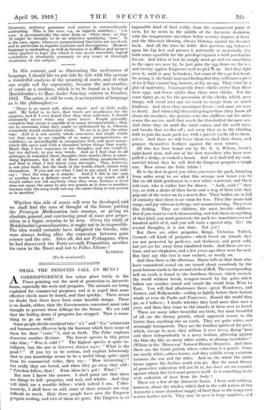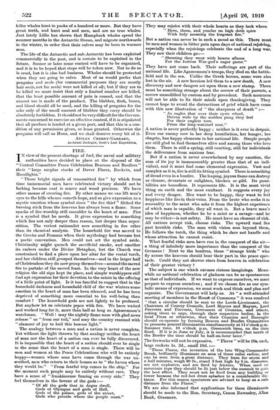SHALL THE PENGUINS CALL US HUNS?
A CORRESPONDENCE has taken place lately in the Times pointing out the need of protection to Antarctic fauna, especially the seals and penguins. The animals are being exploited for commercial purposes, and it is urged that some effective check must be found, And that quickly. There seems no doubt that there have been some horrible doings. There is no doubt, either, that the Governments concerned must take thought to prevent these killings for the future. We are told that the boiling down of penguins has stopped. That is some- thing to go on with !
Some people divide mankind into " a's " and " b's," aristocrats and bureaucrats (Heaven help the bureaux which have some of them for their " crats " !), and so forth. The Polar explorer discovers another division. The lowest species in this genus asks him : " Was it cold ? " The highest species is quite in- telligent, but the one in between always says : What is the good ? " If you try to be serious, and explain laboriously that to you knowledge seems to be a useful thing, quite apart from its commercial value, they say : " How interesting ! " but really they are bored, and when they go away they add : Priceless fellow, that ! Runs ideas he's got ! What !"
But now I know the answer. I shall point out that there are things to kill—penguins, and seal, and whales. And they 'will think me a sensible fellow : which indeed I am. Unfor- tunately, I shall have to add, some of these animals are very difficult to reach. Only three people have seen the Emperor penguin nesting, and two of them are gone. The Emperor is an impossible kind of bird really, from the commercial point of view, for he nests in the middle of the Antarctic darkness, with the temperature anywhere below seventy degrees of frost. and the blizzards blowing, always blowing, against his devoted back. And all the time he holds that precious egg balanced upon his big feet and presses it paternally or maternally (for both sexes squabble for the privilege) against a bald patch in his breast. And when at last he simply must go and eat something in the open sea near by, he just puts the egg down on the ice, and twenty eggless Emperors rush to pick it up. And they fight over it, until it may be broken ; but some of the ei-xs hatch out. So strong is the birds' maternal feeling that they will nurse a piece of ice if they cannot beg, borrow, or lay an egg. They exist by a glut of maternity. Consequently fewer chicks arrive than there were eggs, and fewer adults than there were chicks. For the same fights go on for the possession of the chicks, which, peer things, will crawl into any ice-crack to escape from so much kindness. And there they sometimes freeze ; and some are torn to death. And when a big blizzard is going to blow (they know all about the weather), the parents take the children out for miles across the sea-ice, until they reach the threshold of the open sea. And there they sit until the wind comes, and the swell rises, and breaks that ice-floc off ; and away they go in the blinding drift to join the main pack-ice, with a private yacht all to them- selves. And there we will leave them to shed their down, and prepare themselves feathers against the next winter.
AU this has been found out by Dr. E. A. Wilson, Scott's right-hand man, and one of the best travellers who have ever pulled a sledge, or cooked a hoosh. And so I shall tell my com- mercial friend that he will find the Emperor penguin a tough nut. How about the little Adilie ?
He is the first to greet you when you enter the pack, hurrying from miles away to see what this strange new beast can he like an old little gentleman in a new white waistcoat, and black tail-coat, who is rather late for dinner. " Anrk, aark ! " they cry, as with a shake of their backs and a wag of their tails they pop out of the water on to a nearer floe. Their bodies are so full of curiosity that there is no room for fear. .They like music-hall songs, and joy-rides on icebergs, and mountaineering. They even like drilling. They are children, the most lovable children. But if you want to catch them nesting, and boil them, oranything of that kind, you must penetrate the pack-ice, sometimes several hundred miles of it, and you will want a special ship. No! Oa second thoughts, it is not done. Not yet !
But there are other penguins, Kings, Victories, Tufted. Crested—all kinds of penguins—which breed on islands that are not protected by pack-ice, and darkness, and great cold, but yet are far away Irons inhabited lands. And there are sea- lions, and sea-elephants, and a few years ago there were fur seal. But they say this last is now extinct, or nearly so.
And then there is the albatross. Dante tells us that those wits have committed carnal sin are tossed about ceaselessly by the most furious winds in the second circle of Hell. The corresponding hell on earth is found in the Southern Oceans, which encircle the world without break, tempest-tossed by the gales which follow one another round and round the world from West to East. You will find albatrosses there—great Wanderers, and Sooties, and Mollymawks—sailing as lightly before these furious winds as ever do Paolo and Francesca. Round the world they go, as I believe ; I doubt whether they land more than once a year, and then they come to the islands of these seas to breed. There are many other beautiful sea-birds, but most beautiful of all are the Snowy petrels, which approach nearer to the fairies than anything else on earth. They are quite white, and seemingly transparent. They are the familiar spirits of the pack, which, except to nest, they seldom if ever leave, flying "hero and there independently in a mazy fashion, glittering against the blue sky like so many white moths, or shining snowflakes " (Wilson in the 'Discovery' Natural History Reports). And then there are the Giant petrels, whose coloration is a puzzle. Sonia are nearly white, others brown, and they exhibit every variation between the one and the other. And on the whole the white forms appear the further south you go. But the usual theory of protective coloration will not fit in, for there are no enmities against which this bird must protect itself. Is it something to do with radiation of heat irons the body ? These are a few of the Antarctic fauna. I have said nothing, however, about the whales, which find in the cold waters of the Antarctic a more abundant supply of food than in the temperate waters further north. They may be seen in large numbers, ra• I killer whales hunt in packs of a hundred or more. But they have great teeth, and hunt seal and men, and are no true whales. Just lately Lillie has shown that Humpback whales spend the summer months in the Antarctic Ocean, and migrate northwards in the winter, in order that their calves may be born in warmer seas.
The life of the Antarctic and sub-Antarctic has been exploited commercially in the past, and is certain to be exploited in the future. Sooner or later some control will have to be organized, and it is to be hoped that steps will be taken now. Not to do so is cruel, but it is also bad business. Whales should be protected when they are going to salve. Most of us would prefer that penguins and seals (for commercial purposes they are mostly hair seals, not fur seals) were not killed at all; but if they are to be killed we must insist that only a limited number are killed, that the least possible amount of pain is caused, and that the utmost use is made of the product. The blubber, flesh, bones, and blood should all be used, and the killing of penguins for the sake only of the small amount of blubber they carry should be absolutely forbidden. It should not be very difficult for the Govern- ments concerned to exercise an effective control, if it is stipulated that all produce is landed at a given port, and that this is a con- dition of any permission given, or lease granted. Otherwise the penguins will call us Huns, and we shall deserve every bit of it. APSLEY CHEESY-GaRRARD, As4stant Zoologist. Scott's Last Expedition.







































 Previous page
Previous page